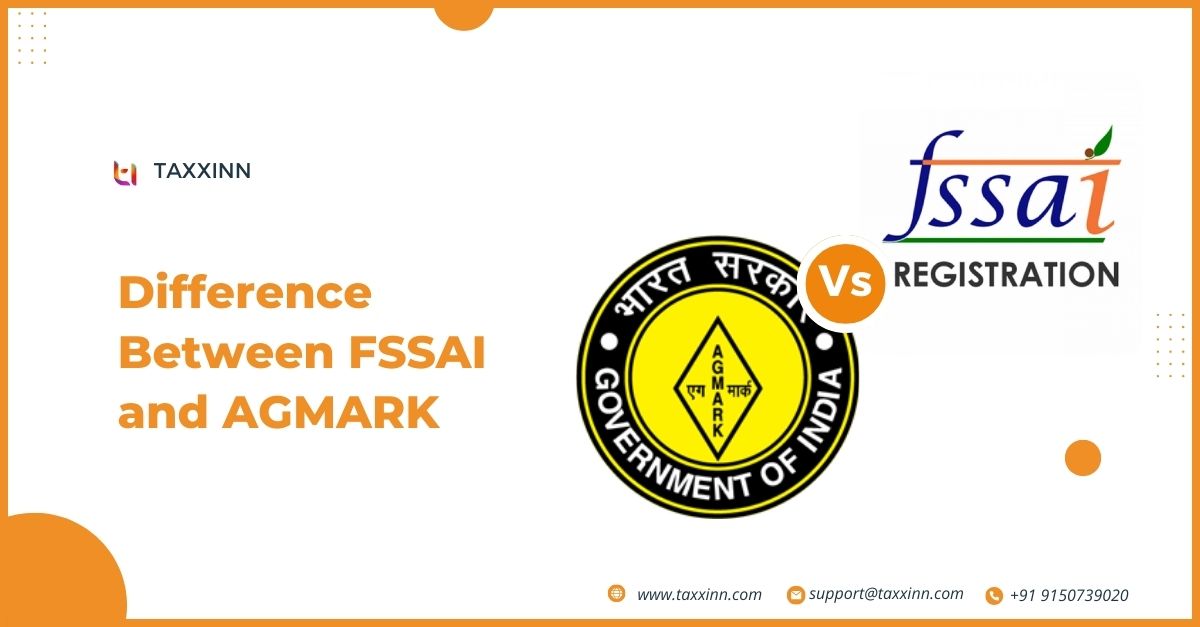In various food industry registrations, confusion can often arise, especially when registration titles are used interchangeably. An example of such a scenario is the registration with FSSAI and AGMARK Registration. Both registrations hold significant importance in the food sector, each offering a multitude of benefits.
The certification issued by AGMARK differs from that issued by FSSAI. The Food Safety and Standards Authority of India has mandated a secure license for food products, while AGMARK serves as a standard stamp for agricultural products.
The introduction of the Food Safety and Standards Act of 2006 seamlessly consolidated its predecessors into a comprehensive piece of regulation. This reorganization is expected to make it easier for users to navigate rules and regulations and ascertain the true quality of food products. However, it’s crucial to recognize a significant difference between FSSAI and AGMARK.
What is FSSAI Registration?
An array of rules and regulations that formerly dealt with food-related concerns in various Ministries and Departments have been incorporated under the Food Safety and Standards Act of 2006, which led to the establishment of the Food Safety and Standards Authority of India (FSSAI). To lay down standards for food products based on science and to control their production, storage, distribution, sale, and import, the FSSAI was established. This will serve to ensure that there is a supply of nutritious food that is secure for human consumption.
Role of FSSAI
- Defining food safety standards and protocols.
- Issuing food safety licences to food establishments.
- Establishing laboratory protocols for food enterprises.
- Contributing to government policy formulation.
- Collecting data on contaminants and emerging risks through a rapid alert system.
- Developing a nationwide food safety information network.
- Raising public awareness regarding food safety and regulations.
Benefits of FSSAI Registration
- By obtaining FSSAI Registration, you enable your capacity to lawfully comply with federal government regulations.
- Registering with the FSSAI allows businesses to avoid fines and penalties.
- The FSSAI Registration Certificate can help you build a reputable and trustworthy image in the market.
- Displaying the registration certificate at your business location and featuring the FSSAI Registration symbol on your food products contributes to the brand image of your company.
- When manufacturing or exporting food products, incorporating the FSSAI logo on your products further enhances customer confidence in your company.
What is AGMARK?
AGMARK serves as a certification mark for agricultural produce, guaranteeing their adherence to specific grade standards outlined by the Directorate of Marketing & Inspection (DMI), Department of Agriculture, Cooperation, and Farmers Welfare, Ministry of Agriculture & Farmers Welfare, under the Agricultural Produce (Grading Marking) Act of 1937. These standards play a critical role in distinguishing between varying levels of quality, with typically 2-3 grades assigned to each agricultural commodity. To date, a comprehensive set of grade standards has been established for 222 agricultural commodities, encompassing a wide range, from fruits and vegetables to cereals, pulses, oilseeds, vegetable oils, ghee, spices, honey, creamery butter, wheat, atta, besan, and more.
Role of AGMARK
- The AGMARK Grading scheme’s objective is to provide customers with food products of exceptional quality and hygiene.
- State Governments issue the AGMARK symbol to indicate the accurate weight of these food items.
- AGMARK markings are exclusively awarded to licenced packers, and closely monitored by authorities, ensuring the quality and purity of agricultural products sourced from local farmers.
- This AGMARK certification process applies to both the domestic and export markets.
Benefits of AGMARK Registration
- Assurance that legal requirements are being strictly followed by your agricultural products.
- Agriculture-related goods are eligible to be exported to other nations.
- AGMARK-certified products are eligible for an array of government incentives and programmes, all of which are available to businesses that sell them.
AGMARK Products in India
- Pulses
- Spices
- Oils extracted from plants
- wheat-based products
- Milk and milk-related items
- Honey
- Rice
- Tapioca Sago
- Unseeded tamarind
- Other Products
AGMARK Symbols
The AGMARK represents a quality Certification Mark granted by the Directorate of Marketing and Inspection, a governmental agency in India. The AGMARK logo adopts a brandmark style, featuring a centrally placed diamond-shaped graphic that includes the organization’s name in bilingual form, both in Hindi and English.
The Difference Between FSSAI and AGMARK
The Indian authorisation for supplying all agricultural products is known as AGMARK.
| FSSAI | AGMARK |
| The Food Safety and Standard Act of 2006 was founded by the FSSAI to operate as a regulatory body for verifying the standard of food products. | An Indian authorisation to supply all agricultural products is called AGMARK. |
| This organisation came into existence as a result of the 2006 Food Safety and Standards Act. | The Agriculture Produce Grading and Marking Act of India sanctioned its establishment in 1937. |
| To ensure wholesome and secure food can be obtained for consumption by humans, it establishes science-based guidelines for food commodities that regulate their manufacturing, storage, distribution, sale, and import. | In India, it is used for agricultural products to make sure they conform to a set of criteria issued by the Directorate of Marking and Inspection, a governmental organisation. |
| Following the volume of business and operation, certificates are distributed. | The issuance of certificates depends on the multiple evaluations of the products. |
| AGMARK norms presently offer quality guidelines for 222 various products, including pulses, essential oils, cereals, vegetable oil, and others. | Although the majority of these items are governed by legal requirements as several standards have been established, this applies to all food products. |
| The 2006 AGMARK is the only requirement for blending edible vegetable oils and fat spreads, to comply with the Food Safety and Standard Act; alternatively, certification is optional. | For all FBOs (Food Business Operators), FSSAI is a must. |
Conclusion
Furthermore, the FSSAI diligently promotes public awareness regarding the importance of food safety. While every food item receives an official seal of approval from the FSSAI, AGMARK is widely acknowledged for its certification mark. Both of these requirements aim to promote optimal hygiene and good health. A complete food licensing and FSSAI registration service will be provided by Taxxinn without any hassle.
Related Reads,
Difference Between FSSAI and FCI.
Difference Between FSSAI Registration and Licence.
FSSAI Registration – A Detailed Guide.
What is FoSCoS FSSAI Registration?
FAQs:
Which food products require AGMARK?
AGMARK norms currently establish quality guidelines for 205 different products, including pulses, essential oils, cereals, vegetable oil, and others.
What is the purpose of the FSSAI?
The FSSAI was established to oversee the production, storage, distribution, and sale of food products and to establish scientifically sound foundations for food items, ensuring food safety for human consumption.
What is AGMARK based on?
AGMARK is exclusively designed for agricultural products.
What does AGMARK stand for?
AGMARK stands for Agriculture Marketing.
What is the minimum duration of the FSSAI licence?
Businesses must apply for renewal at least 30 days before the current licence expires, as the licence is valid for either 1 year or 5 years.
Is obtaining AGMARK certification mandatory?
No, the certification is completely optional. Under the Food Safety and Standards Act and Regulations of 2006, certification under AGMARK is mandatory only for blended edible vegetable oils and fat spreads. AGMARK recognition applies to certain commodities, such as Ghee, butter, Spices, Wheat, Besan, mustard oil, and honey, for domestic trade.


